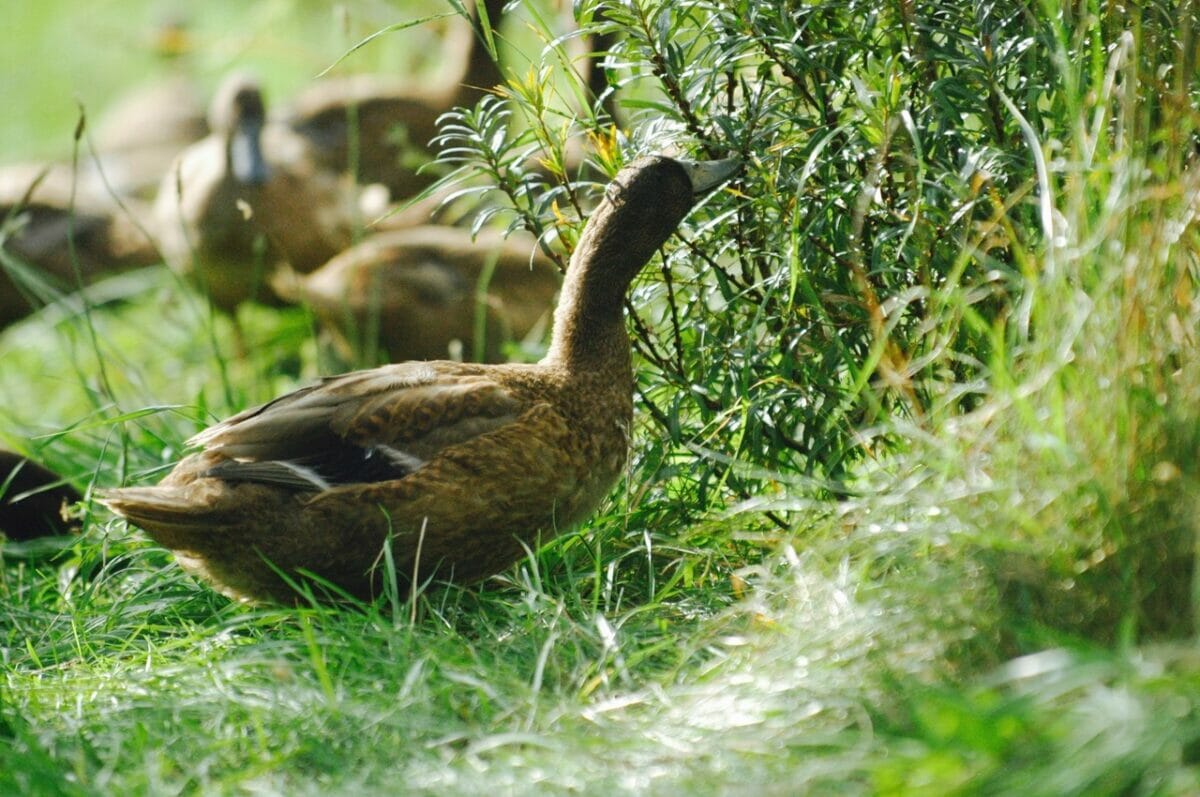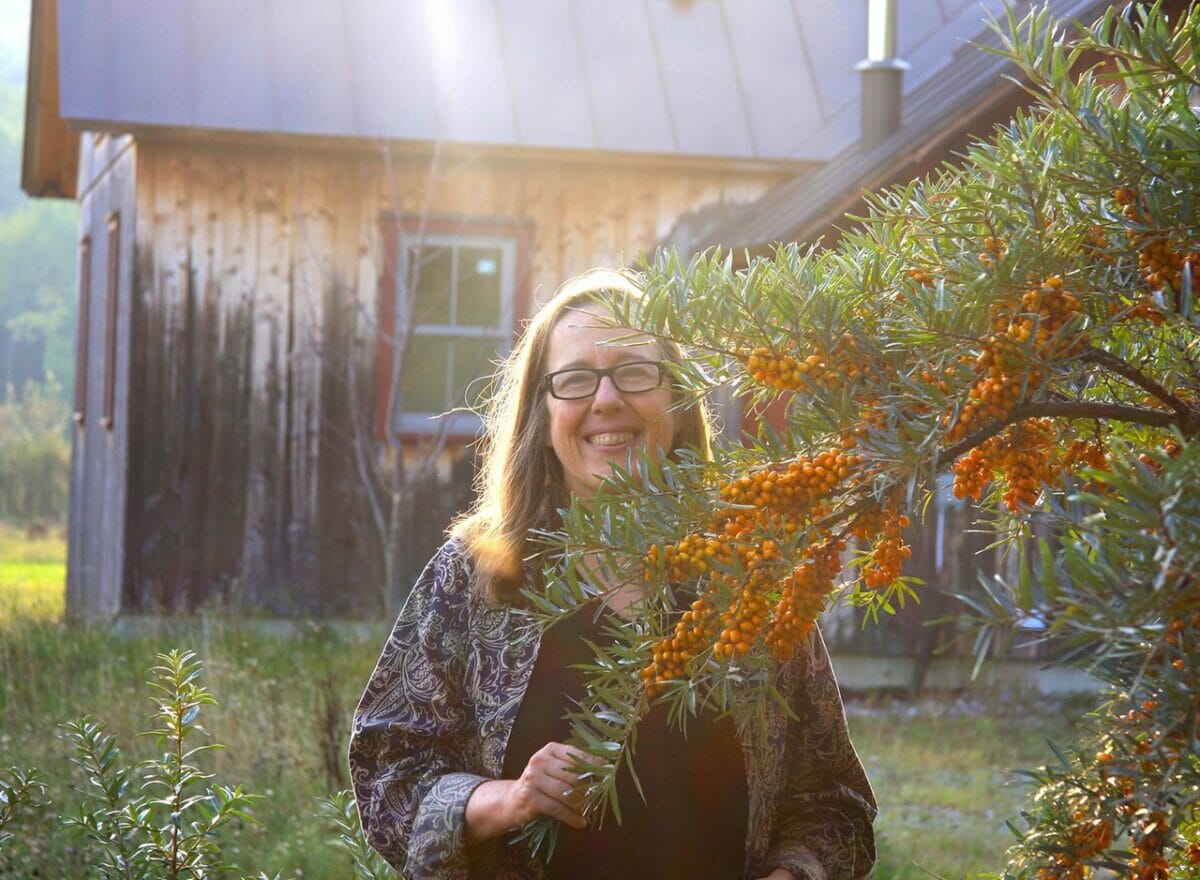Rescued Ducks Play a Vital Role on This Vegan Farm
At Sho Farm in Vermont, vegan farmers Melissa Hoffman and Shawn Smith work hand in hand with the land and its inhabitants.
Rescued Ducks Play a Vital Role on This Vegan Farm
At Sho Farm in Vermont, vegan farmers Melissa Hoffman and Shawn Smith work hand in hand with the land and its inhabitants.

The rescued ducks play an integrated role on the farm.courtesy of Sho Farm.
In the Green Mountains of northern Vermont, a plot of nearly 1,300 acres is home to an abundance of flora and fauna, a flock of ducks and two farmers: Melissa Hoffman and Shawn Smith. The ducks at Sho Farm and Sanctuary are not being raised to be slaughtered for food. Rather, they are naturally incorporated into farming operations, helping to manage pests and add fertilizer to the soil.
Since 2015, Sho Farm, which expanded to include a farmed animal sanctuary the following year, has grown into a true model for regenerative vegan farming, where focus is placed on working with traditional ecological knowledge and living harmoniously alongside other life. At Sho Farm and Sanctuary, food is seen not as a commodity but as a relationship with land and life.
In the beginning, Hoffman, who has a background in organic farming and ecology action, worked with ecologists and biologists to survey the plants and wildlife inhabiting the sprawling and varied space. This was “to understand who was living here, so that everything we did was in relationship to the life already here,” she says.
The methods of food production at Sho Farm and Sanctuary, as well as the farmers’ philosophy of working with rather than against nature, are in stark contrast to most modern agricultural systems. And that’s the point. “We’ve been talking a lot about the broken food system and the consequences of it to the environment, to wildlife, to the animals in animal agriculture and to human health,” says Smith, adding that it’s not just the food system that’s broken. “It’s the relationship between humans, non-human animals, nature and land—the enormous disconnect humans have with the food that they eat.”

Today, the farmers utilize methods of what they call wildlife-assisted agroforestry (“the forest is the farm,” notes Hoffman) and perennial farming, without tilling and with “slaughter-free inputs” from their ducks. As a result, Hoffman and Smith produce and sell a variety of hemp and CBD products, medicinal tinctures, mushroom broths, misos, fresh berries and probiotic brews, made from a variety of grown and foraged plants and fungi on the farm.
The sanctuary part of Sho Farm was birthed soon after Hoffman met and married Smith, who has Indigenous roots and a background in environmental law and land conservation. Now, the farm is not only a refuge for inhabiting and visiting wildlife but also for the flock of 108 domestic Khaki Campbell ducks that live on the property permanently. The ducks were adopted from a nearby organic rice farm, where the then-small ducklings were used to gently control weeds and insects in the rice patties and from where Hoffman and Smith bought rice. As the ducks grew bigger though, they risked causing damage to the delicate plants. So, when the rice farmer needed somewhere for his growing flock to go, Hoffman and Smith offered them a forever home.
The rescued ducks play a vital, integrated role on the farm, explains Smith, by naturally providing pest control, fertilizer, aeration and (fuel-free) land maintenance, just as by-products of their existence. “We noticed where we summered groups of ducks and portions of the food system that were not doing very well. The following year, the food system was robust,” she says. “And in very little time.”
But perhaps the greatest asset the ducks offer the farm is their soiled bedding. During cooler weather, the birds spend more time in their solar-powered barn, which gets mucked daily. The soiled bedding, a mix of sawdust and hay, then gets added to compost piles, where with the help of red worms, rich compost is created that can be later utilized within the food system or even grown in directly. “We direct plant things that we know the ducks love to eat and that we can eat as well; so, while the compost piles are breaking down and aging, they are also growing pumpkins and pumpkin leaves or lamb’s quarters or pigweed,” says Smith.
It’s a symbiotic relationship that works well. “Animals don’t have to be part of a farm in a commodity sense, they can be part of the farm as a partner,” Smith says. “They are wonderful partners.”
Follow us
This work is licensed under a Creative Commons Attribution-NoDerivatives 4.0 International License.
Want to republish a Modern Farmer story?
We are happy for Modern Farmer stories to be shared, and encourage you to republish our articles for your audience. When doing so, we ask that you follow these guidelines:
Please credit us and our writers
For the author byline, please use “Author Name, Modern Farmer.” At the top of our stories, if on the web, please include this text and link: “This story was originally published by Modern Farmer.”
Please make sure to include a link back to either our home page or the article URL.
At the bottom of the story, please include the following text:
“Modern Farmer is a nonprofit initiative dedicated to raising awareness and catalyzing action at the intersection of food, agriculture, and society. Read more at <link>Modern Farmer</link>.”
Use our widget
We’d like to be able to track our stories, so we ask that if you republish our content, you do so using our widget (located on the left hand side of the article). The HTML code has a built-in tracker that tells us the data and domain where the story was published, as well as view counts.
Check the image requirements
It’s your responsibility to confirm you're licensed to republish images in our articles. Some images, such as those from commercial providers, don't allow their images to be republished without permission or payment. Copyright terms are generally listed in the image caption and attribution. You are welcome to omit our images or substitute with your own. Charts and interactive graphics follow the same rules.
Don’t change too much. Or, ask us first.
Articles must be republished in their entirety. It’s okay to change references to time (“today” to “yesterday”) or location (“Iowa City, IA” to “here”). But please keep everything else the same.
If you feel strongly that a more material edit needs to be made, get in touch with us at [email protected]. We’re happy to discuss it with the original author, but we must have prior approval for changes before publication.
Special cases
Extracts. You may run the first few lines or paragraphs of the article and then say: “Read the full article at Modern Farmer” with a link back to the original article.
Quotes. You may quote authors provided you include a link back to the article URL.
Translations. These require writer approval. To inquire about translation of a Modern Farmer article, contact us at [email protected]
Signed consent / copyright release forms. These are not required, provided you are following these guidelines.
Print. Articles can be republished in print under these same rules, with the exception that you do not need to include the links.
Tag us
When sharing the story on social media, please tag us using the following: - Twitter (@ModFarm) - Facebook (@ModernFarmerMedia) - Instagram (@modfarm)
Use our content respectfully
Modern Farmer is a nonprofit and as such we share our content for free and in good faith in order to reach new audiences. Respectfully,
No selling ads against our stories. It’s okay to put our stories on pages with ads.
Don’t republish our material wholesale, or automatically; you need to select stories to be republished individually.
You have no rights to sell, license, syndicate, or otherwise represent yourself as the authorized owner of our material to any third parties. This means that you cannot actively publish or submit our work for syndication to third party platforms or apps like Apple News or Google News. We understand that publishers cannot fully control when certain third parties automatically summarize or crawl content from publishers’ own sites.
Keep in touch
We want to hear from you if you love Modern Farmer content, have a collaboration idea, or anything else to share. As a nonprofit outlet, we work in service of our community and are always open to comments, feedback, and ideas. Contact us at [email protected].by Jessica Scott-Reid, Modern Farmer
May 8, 2022
Modern Farmer Weekly
Solutions Hub
Innovations, ideas and inspiration. Actionable solutions for a resilient food system.
ExploreExplore other topics
Share With Us
We want to hear from Modern Farmer readers who have thoughtful commentary, actionable solutions, or helpful ideas to share.
SubmitNecessary cookies are absolutely essential for the website to function properly. This category only includes cookies that ensures basic functionalities and security features of the website. These cookies do not store any personal information.
Any cookies that may not be particularly necessary for the website to function and are used specifically to collect user personal data via analytics, ads, other embedded contents are termed as non-necessary cookies.
Inspiring story and surely something we can all work towards for a healthier, happier future together.
Thanks for this! It’s absolutely necessary that we learn to work with the land and stop farming animals, if we are to have a future. From a climate perspective, from an environmental perspective, and from a pandemic perspective, we need to stop using animals for food.
Wonderful practice in modern world where people consider every thing commercial.
Sounds like a win-win. The ducks get forage and the farmers get pest control. Regenerative farming is basically taking two problems and merging them for a solution.
This vegan farm shows how eating meat can and should be part of a sustainable future, although at much lower levels than Americans currently eat meat. NOT eating these ducks at the end of their life would be wasteful. If they don’t want to because they’re vegan, I hope they let someone else.
What a crock. How much money did you go to vt with to buy 1300 acres? If you actually needed to support a famiy from that property without any trust funds or from your former high earner lives you would fail.